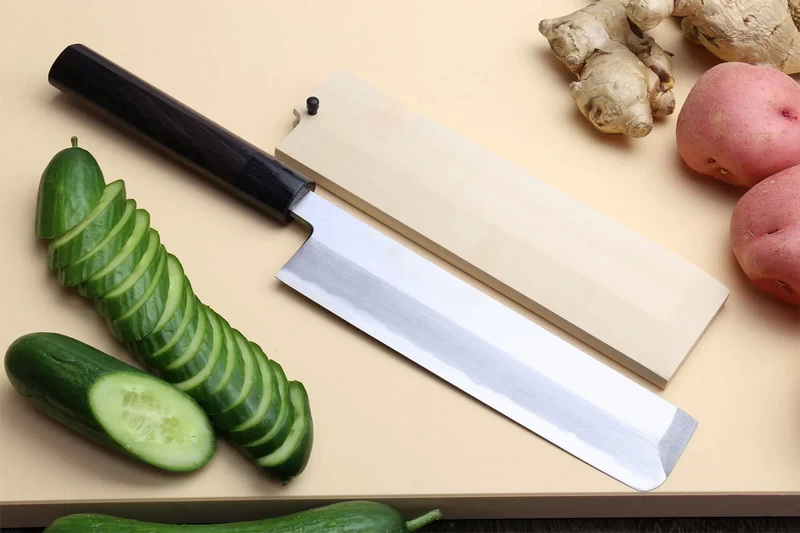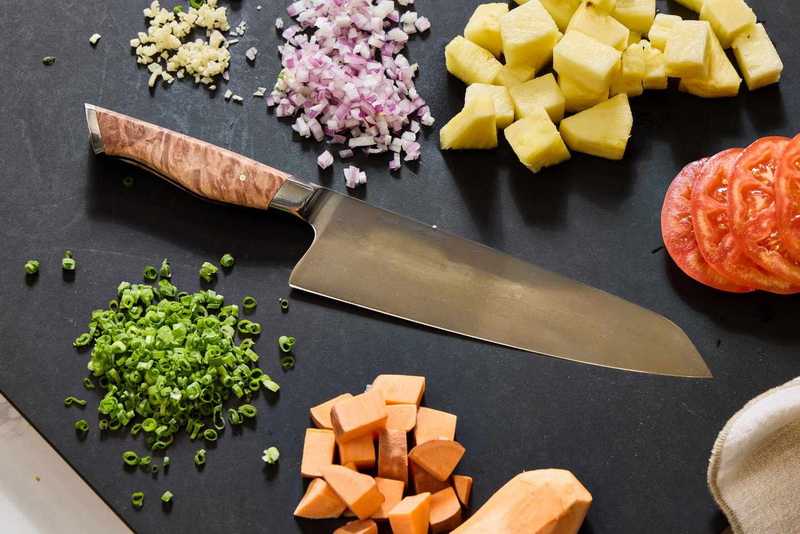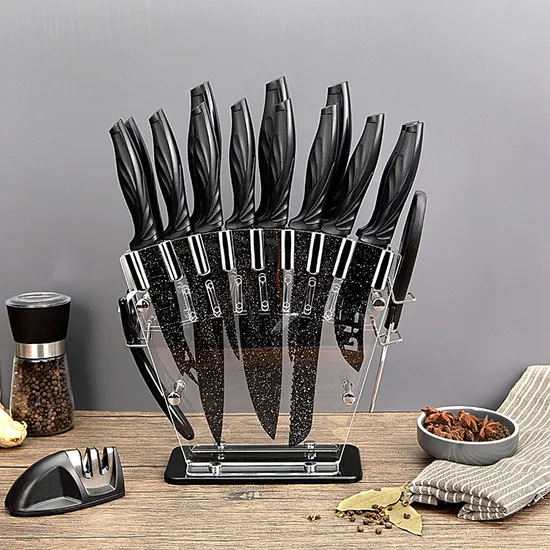

Views: 222 Author: Ella Publish Time: 2025-06-07 Origin: Site








Content Menu
● Why Consider Lubricating Cooking Knives?
● What Type of Oil Should You Use for Cooking Knives?
● How to Properly Lubricate Your Cooking Knives
>> Step 1: Clean and Dry the Knife
>> Step 3: Wipe Off Excess Oil
>> Avoid Dishwasher and Soaking
>> Special Care for Carbon Steel Knives
● Understanding the Role of Lubrication in Knife Performance
● Common Misconceptions About Lubricating Cooking Knives
● How to Maintain Knives Without Lubrication
● Visual and Video Demonstrations
● FAQ
>> 1. Do I need to lube stainless steel kitchen knives?
>> 2. Can I use olive oil to lube my cooking knives?
>> 3. How often should I oil my kitchen knives?
>> 4. Is it safe to lube the edge of the knife?
>> 5. Can lubrication replace sharpening?
Cooking knives are essential tools in every kitchen, used daily for preparing meals. Proper maintenance is key to keeping them sharp, safe, and long-lasting. One common question among both professional chefs and home cooks is: Do you need to lube cooking knives? This comprehensive guide will explore the necessity of lubricating kitchen knives, how to do it correctly, and the benefits it offers. Along the way, we will cover cleaning, sharpening, and storage tips to help you maximize the lifespan and performance of your knives.

Cooking knives are typically made of high-carbon stainless steel or carbon steel. Both materials are prone to corrosion, rust, and wear if not cared for properly. Lubricating your knives with the right oil forms a protective barrier that:
- Prevents rust and corrosion by repelling moisture and acidic residues.
- Reduces friction on moving parts (especially for folding knives).
- Helps maintain the knife's sharpness by protecting the blade edge.
- Enhances the knife's appearance by preventing discoloration and staining.
While lubrication is essential for outdoor or folding knives, it is also beneficial for kitchen knives, especially those made from carbon steel, which is more reactive to acids found in foods like tomatoes and citrus.
Choosing the right oil is crucial because kitchen knives come into direct contact with food. Therefore, the oil must be food-safe, non-toxic, and non-rancid. Here are the best options:
- Food-grade mineral oil: This is the most recommended oil for kitchen knives. It is odorless, tasteless, non-toxic, and does not go rancid. Mineral oil protects the blade without leaving sticky residues.
- Camellia oil: A natural, food-safe oil often used for carbon steel knives. It protects the blade and promotes a slow, even patina without affecting flavor or smell.
- Olive oil or vegetable oils: These can be used occasionally but are less stable and may go rancid over time, potentially affecting the knife and food.
Avoid using WD-40 or other penetrating oils that are not food-safe, as they can contaminate food and damage the blade.
Lubricating your knife is a simple process but requires attention to detail to avoid over-oiling or missing critical areas.
Always start by thoroughly cleaning your knife with warm, soapy water, especially after cutting acidic foods. Avoid abrasive sponges and never put knives in the dishwasher. Dry the knife completely with an absorbent towel to prevent moisture from causing rust.
- Use a clean, lint-free cloth or paper towel.
- Put a few drops of food-grade mineral oil or camellia oil on the cloth.
- Spread a thin, even layer of oil along the entire blade, from spine to edge.
- For carbon steel knives, you can also lightly oil the edge to help maintain sharpness, but avoid direct finger contact with the blade edge for safety.
Remove any excess oil with a clean cloth to prevent dust and dirt from sticking to the blade.
Store your knives in a dry place, such as a magnetic wooden strip, knife block, or a knife roll. Avoid leaving knives in damp environments or soaking in water.
A sharp knife is safer and more efficient. Regular honing with a honing rod keeps the edge aligned, while sharpening (using a whetstone or professional service) restores the blade edge when dull. Honing should be done frequently, even before or after each use if possible, to maintain the blade's cutting ability. Sharpening, on the other hand, is less frequent and depends on usage but is essential to restore the blade's original edge.
Dishwashers and prolonged soaking can damage knives by causing corrosion and dulling the blade. The high heat and harsh detergents in dishwashers strip protective coatings and encourage rust formation. Soaking knives in water, especially if left for hours, can cause the handle to warp or the blade to rust. Hand wash immediately after use and dry thoroughly.
Carbon steel knives require more frequent oiling and cleaning due to their susceptibility to rust and discoloration. After each use, clean, dry, and oil them to maintain their condition. Carbon steel knives develop a patina over time, which can protect the blade but also change its appearance. Proper oiling helps control this process and prevents unwanted rust spots.
- Always use a cutting board made of wood or plastic to protect the knife's edge. Avoid cutting on glass, stone, or metal surfaces.
- Avoid twisting or prying with the knife, as this can chip or dull the blade.
- Use the right knife for the task to reduce unnecessary wear. For example, use a chef's knife for chopping and a paring knife for peeling.

Lubrication plays a subtle but important role in the overall performance of cooking knives. While it does not sharpen the blade or replace proper honing and sharpening, it helps reduce friction during cutting, especially when slicing through sticky or wet foods. This can make cutting smoother and more efficient, reducing hand fatigue.
In folding knives or knives with moving parts, lubrication is essential to keep the mechanism working smoothly and prevent rust buildup in the pivot area. Although most kitchen knives are fixed blades, some specialty knives may have folding or adjustable components that benefit from lubrication.
- Lubrication is only for outdoor or survival knives: While it is true that outdoor knives require regular lubrication due to exposure to harsh environments, kitchen knives, particularly carbon steel ones, also benefit from lubrication to prevent rust and corrosion.
- Oiling makes knives slippery and unsafe: When applied correctly and wiped off properly, oiling does not leave a slippery residue. Instead, it forms a thin protective layer that does not interfere with grip or handling.
- Lubrication replaces cleaning: Lubrication is a maintenance step after cleaning, not a substitute. Dirty knives should always be cleaned first to remove food particles and residues before oiling.
If you prefer not to oil your knives, especially stainless steel ones, you can still maintain them well by:
- Washing and drying immediately after use.
- Storing in a dry, ventilated area.
- Regularly honing and sharpening.
- Avoiding acidic foods or rinsing knives immediately after contact with them.
However, this approach may not be sufficient for carbon steel knives or knives used infrequently, which are more prone to rust.
Visual and video demonstrations can be highly effective in learning knife maintenance techniques. They typically cover:
- Step-by-step cleaning and drying procedures.
- Proper application of oil on different types of knives.
- Sharpening and honing techniques using whetstones and honing rods.
- Storage solutions that prevent damage and rust.
Watching these tutorials can help reinforce best practices and avoid common mistakes.
Lubricating cooking knives is not strictly mandatory for every kitchen knife but is highly recommended, especially for carbon steel knives or knives that are not stainless steel. Using a food-safe oil like mineral oil or camellia oil protects your blades from rust, corrosion, and wear, prolonging their lifespan and maintaining their sharpness. Proper cleaning, drying, and storage combined with occasional lubrication form the foundation of excellent knife care. Regular maintenance ensures your knives remain safe, effective, and visually appealing for years to come.

No, stainless steel knives are more resistant to rust and corrosion, so they do not require frequent lubrication. However, occasional oiling can still help maintain their appearance and prevent minor stains.
Olive oil can be used in a pinch, but it is not ideal because it can go rancid and leave a sticky residue. Food-grade mineral oil or camellia oil is preferred for long-term protection.
For carbon steel knives, oiling after every use or at least weekly is recommended. For stainless steel knives, monthly oiling or as needed is sufficient.
Yes, but you should avoid touching the sharp edge directly with your fingers. Apply oil to a cloth and gently rub it along the edge to protect it without risking injury.
No, lubrication protects against rust and reduces friction but does not sharpen the blade. Regular sharpening and honing are necessary to maintain a sharp cutting edge.